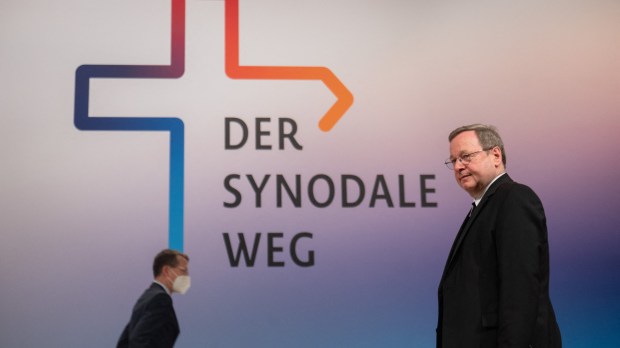While several reform proposals in the Catholic Church have sparked controversy in Germany in recent weeks, the Holy See warns that they could cause “a wound to ecclesial communion and a threat to the unity of the Church,” in a brief statement issued July 21, 2022.
Last February, participants in Germany’s synodal assembly had overwhelmingly advocated for the ordination of women, the marriage of priests, and a new doctrinal approach to homosexuality. More recent statements have also included an acceptance of abortion.
In Germany, Catholics are experiencing two simultaneous synodal processes: a National Synodal Way launched in 2019 in the context of the abuse crisis and secularization, and, like the rest of the world, the Synod on Synodality launched in the universal Church in 2021.
Both these spiritual and collective processes aim to reflect on the future of the Church.
The Holy See’s communiqué, in an unusual format, is not signed by the pope or a specific dicastery. However, the Pope had recently chided the Church in Germany by referring to “the very good evangelical church that exists in Germany” and saying, “We don’t need another one.”
More formally, the statement now indicates a firm rejection of some of the reformist impulses expressed by participants in the Synod in Germany.
The statement:
“In order to protect the freedom of the People of God and the exercise of the episcopal ministry, it seems necessary to clarify that the ‘Synodal Path’ in Germany does not have the faculty to oblige bishops and the faithful to assume new forms of governance and new approaches to doctrine and morals. It would not be lawful to initiate in the dioceses, prior to an agreed understanding at the level of the universal Church, new official structures or doctrines, which would represent a wound to ecclesial communion and a threat to the unity of the Church.”
The statement goes on to cite the words of Pope Francis contained in his Letter to the Pilgrim People of God in Germany, “the universal Church lives in and of the particular Churches, just as the particular Churches live and flourish in and from the universal Church. If they find themselves separated from the entire ecclesial body, they weaken, rot and die. Hence the need always to ensure that communion with the whole body of the Church.”
“Therefore,” the statement concludes, “it is hoped that the proposals of the path of the Particular Churches in Germany will converge into the synodal path being taken by the universal Church, for mutual enrichment and a witness to that unity by which the body of the Church manifests its fidelity to Christ the Lord.”
What are the threats to unity?
The text does not specify what threatens unity in the progressive German positions that have been officially defended at the highest level for three years.
Nevertheless, several particularly radical positions have been expressed by Church leaders in Germany in recent days, especially within the Central Committee of German Catholics (ZdK), an organization that plays a leading role in the synodal process.
Marc Frings, a senior member of the ZdK, called for a “re-evaluation of homosexuality” at the German synod in a contribution to the American LGBTQ Catholic blog Outreach.
In this text, he maintains that dogma must urgently recognize that “every human being has been created by God with his or her sexuality and, being so created, has an inviolable dignity.”
Another position, this time taken by the president of the group, Irme Stetter-Karp, has caused controversy because of her position on abortion. Reacting to the overturning of Roe vs. Wade in the United States in an interview with the national daily Die Zeit, she called for a “guarantee that the medical intervention of an abortion is made possible throughout Germany.”
Protesting views
Over the past few months, many bishops, especially in Poland, Scandinavia, the United States, and Africa, have expressed their concern about the German process, seen as a risk of detaching German dioceses from communion with the rest of the Catholic world.
A symposium on the priesthood organized in February 2022 by Cardinal Marc Ouellet could be interpreted as a response to proposals that questioned the profound identity of the priesthood, especially on the issue of celibacy.
Last month, Cardinal Walter Kasper, president emeritus of the Pontifical Council for Christian Unity, who is considered a figure of the reformist wing of the German episcopate, also voiced strong criticism. On June 9, in the journal of the diocese of Passau, Cardinal Kasper declared that the German Synodal Way suffered from a “serious birth defect” because its debates were not based on the Gospel.
On June 21, in an online seminar, this cardinal denounced the Synodal Way’s proposals as “an attempt at a coup d’état,” accusing the German bishops who support the proposals of engaging in “collective resignation.”
Cardinal Reinhard Marx, Archbishop of Munich-Freising, who is very much in favour of a major structural reform of the Church, recently deplored the excesses of the German Synodical Way. He criticized a “completely failed proposal” that could be seen as a challenge to the priesthood as such. “There is no Catholic Church without priests,” he felt obliged to remind the audience from the pulpit.
With this message, the Holy See seems to be backing those who have curbed the German path. As a result, the position of the president of the German episcopate, Bishop Georg Bätzing, a fervent defender of the Synodal Way, will be considerably weakened.
In a recent interview on German radio, he said he was “disappointed” by Pope Francis, but qualified his statement by saying: “He is doing what he can.”


